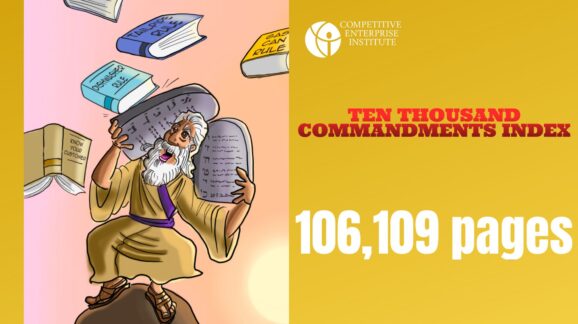There are two main areas in which Congress can enact meaningful reform. The first is to rein in regulatory guidance documents, which we refer to as “regulatory dark matter,” whereby agencies regulate through Federal Register notices, guidance documents, and other means outside standard rulemaking procedure. The second is to enact a series of reforms to increase agency transparency and accountability of all regulation and guidance. These include annual regulatory report cards for rulemaking agencies and regulatory cost estimates from the Office of Management and Budget for more than just a small subset of rules.
In 2019, President Trump signed two executive orders aimed at stopping the practice of agencies using guidance documents to effectively implement policy without going through the legally required notice and comment process.
Featured Posts

Blog
The Dreck Equation: Charting the regulatory cosmos
Most people think of federal regulation as the 3,000 or so rules published each year in the Federal Register and archived in the Code of…

Blog
The week in regulations: Deep seabed mining and recreational gulf gag
A massive flood in Texas killed at least 120 people. President Trump announced new 50 percent copper tariffs which will take effect on August 1.

Blog
The logbook of federal red tape last year came to…
The Federal Register for 2024 closed out Joe Biden’s final year in office with a record 106,109 pages. This count swamps the previous record of…
Search Posts
Blog
The Economy after COVID-19 Will Be Different from Before, Part One
As governors begin to lift restrictions on economic activity, polling data show that Americans are generally still afraid of the virus and have changed their…
Blog
Like the Sun Not Rising in the East?
The Federal Register, the official daily government publication of regulations, proposed rules, and similar items did not go online today. We were awaiting today’s Federal…
Blog
The Coronavirus Outbreak Highlights Importance of the Artificial Intelligence Debate
Tracing of individuals and other measures involving artificial intelligence are in the news with respect to managing individuals’ reentry into the economy in the wake…
Blog
This Week in Ridiculous Regulations
New unemployment applications were down to 4.4 million last week. This is still more than an order of magnitude greater than the pre-coronavirus record. With…
Blog
DEREGULATION IN AN EMERGENCY: The President’s Emergency Powers Include Not Just Imposing Regulations on Industry, but also Suspending Regulations
Across the country, governors have suspended harmful regulations on an emergency basis due to the COVID-19 crisis. The improvements that have resulted have got people…
Blog
Congress Has Already Introduced Bills to Reform #NeverNeeded Regulations
Policy makers have already waived more than 350 regulations and counting that were slowing the pandemic response and harming economic recovery. But with a 185,000-page…
Staff & Scholars

Clyde Wayne Crews
Fred L. Smith Fellow in Regulatory Studies
- Business and Government
- Consumer Freedom
- Deregulation

Ryan Young
Senior Economist
- Antitrust
- Business and Government
- Regulatory Reform

Fred L. Smith, Jr.
Founder; Chairman Emeritus
- Automobiles and Roads
- Aviation
- Business and Government

Sam Kazman
Counsel Emeritus
- Antitrust
- Automobiles and Roads
- Banking and Finance

Marlo Lewis, Jr.
Senior Fellow
- Climate
- Energy
- Energy and Environment